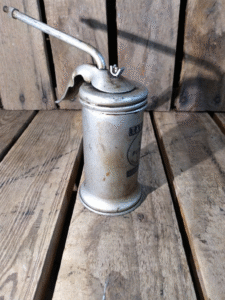Ever wandered into your dad’s garage or your grandpa’s shed and spotted a strange little metal can with a skinny spout and a squeeze trigger? Maybe you thought it was a weird old thermos or some kind of forgotten kitchen gadget. But if you grew up in the ‘70s or ‘80s, that object wasn’t just background clutter—it had a purpose.
That peculiar piece of metal was actually a hand-squeezed oil can. It wasn’t there for decoration. It was there to work. And it worked hard. Before slick spray lubricants became household staples, these little cans were the go-to tool for fixing just about anything that creaked, squeaked, or refused to move.

Back in the day, before we could grab a can of WD-40 and call it a day, these oil cans were the real MVPs. Whether it was a rusty chain on your banana-seat bike, a squeaky screen door, or a stiff lawnmower throttle, that hand-oiler was the answer.
It wasn’t flashy. There were no bells or whistles. But when you gave that trigger a gentle squeeze and heard the soft hiss of oil hitting its mark, you knew something was about to get a whole lot smoother. That sound? It was like a tiny victory drumroll.
Video: 1950s French Oil Can Restoration – Perfect Restoration
What Made This Metal Marvel So Special?
This wasn’t just some metal thing you squirted oil from. It was well-designed, almost overbuilt for what it did. Here’s what set it apart:
A Rugged Metal Body
Most of these cans were crafted from steel or aluminum. They weren’t delicate. They could take a drop, a knock, or even a fall off the workbench without giving up.
A Cleverly Curved Spout
The nozzle was long, skinny, and often bent just enough to reach places your fingers couldn’t—inside engines, behind hinges, or deep inside a drill press.
A Trigger That Gave You Control
That squeeze handle wasn’t just for show. It let you deliver oil precisely, one squirt at a time. No gushing. No mess. Just accuracy and efficiency.
In a world of disposable gadgets and plastic parts, this tool felt like it meant business. It was made for people who fixed things with their hands—and took pride in it.
Where You’d Spot One Without Thinking
These oil cans weren’t hiding in plain sight. They were part of the scenery. You’d see them everywhere without realizing how much they mattered.
On a dusty shelf in the garage, half-buried under rags and bolts. Hanging on a nail beside an old handsaw. Riding around in the back of a station wagon, just in case. Some households even kept one under the sink—for emergency hinge duty.
It was one of those tools you didn’t talk about. You just used it. And when you needed it, you were glad it was there.
Why It Disappeared From Everyday Life
By the time the late ‘80s rolled around, new products had taken over. Aerosol spray lubricants with built-in nozzles were everywhere. They were fast, easy, and didn’t require any clean-up or precision.
So the old-school oil can quietly stepped aside. People tossed them out or boxed them up. Some just rusted away in forgotten toolboxes. And with them went a small piece of everyday craftsmanship.
But that doesn’t mean they stopped being useful.
Why These Old Oil Cans Still Matter
Video: Vintage Oil Can Spout
Modern spray cans might be convenient, but they’re not always better. The hand-squeezed oil can offered something those sprays rarely do: control.
With a manual can, you control exactly how much oil comes out and exactly where it goes. You’re not dealing with overspray or propellants. You’re just applying oil where it’s needed—nothing more, nothing less.
And they’re built to last. No plastic bits that crack. No cans that lose pressure over time. Just solid mechanics doing what they were made to do.
In a way, these cans represent a whole philosophy that’s fading: maintain it, don’t toss it. Repair it, don’t replace it. They remind us of a time when people took care of their stuff instead of treating everything like it was disposable.
Still Useful Today (Yep, Really)
Believe it or not, people still use these cans today. Tinkerers, hobbyists, mechanics, and vintage restoration lovers swear by them. If you’ve got a squeaky hinge on an antique cabinet or an old sewing machine that needs some love, a vintage oil can might be your best friend.
And for collectors? These cans are gold. Each one tells a story. Scratches, rust, and all. They’re part of the history of how we kept our machines—and our lives—running smoothly.
Conclusion
That weird little metal can wasn’t just garage clutter. It was a symbol of self-reliance, practicality, and hands-on problem-solving. It didn’t need a battery. It didn’t break after a year. It just did its job, one well-aimed squirt at a time.
In a world that loves fast fixes and replacements, maybe it’s time we brought a little bit of that old-school wisdom back. So if you find one of these cans at a flea market or buried in your grandpa’s toolbox, don’t walk past it. Pick it up. Give it a squeeze. You just might bring something back to life—both literally and metaphorically.





